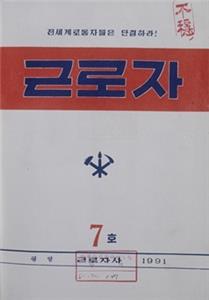Kulloja
 Cover in 1991 | |
| Categories | Political magazine |
|---|---|
| Frequency | Monthly |
| First issue | 25 October 1946 |
| Country | North Korea |
| Based in | Pyongyang |
| Language | Korean |
| OCLC | 9516938 |
| Kulloja | |
| Chosŏn'gŭl | |
|---|---|
| Hancha | |
| Revised Romanization | Geulloja |
| McCune–Reischauer | Kŭlloja |
| IPA | [kɯːllod͡ʑa] |
| lit. 'Worker' | |
Kulloja (근로자; Korean for 'Worker') is a political magazine published in North Korea. Launched in 1946 it is published monthly and is an official publication of the Central Committee of the Workers' Party of Korea
History and profile[]
Kulloja was first published on 25 October 1946.[1] It is published on a monthly basis.[1][2] The magazine is an official organ of the Central Committee of the Workers' Party of Korea,[2] and covers articles on political science.[3]
Major contributors of Kulloja have included: Kim Chol and .[4] North Korean human rights experts also published articles in the magazine, including , and .[5]
Editors-in-chief[]
- (October 1946 – November 1947)
- Pak Chang-ok (November 1947 – March 1948)
- (March 1948 – 1950)
See also[]
- Rodong Sinmun – Central Committee of the Workers' Party of Korea daily
- Qiushi – Communist Party of China equivalent
References[]
- ^ a b North Korea Handbook. Seoul: M.E. Sharpe, Yonhap News Agency. 27 December 2002. p. 929. ISBN 978-0-7656-3523-5.
- ^ a b The Europa World Year: Kazakhstan - Zimbabwe. Routledge. 2004. p. 2483. ISBN 978-1-85743-255-8.
- ^ Wha-In Kim (2007). The Media-government Relations: Comparative Analysis of the United States, South Korea and North Korea's Media Coverage of Foreign Policy (PhD thesis). Rutgers University. p. 23. ISBN 978-1-109-05643-3. OCLC 429412646.
- ^ Song Jiyoung (2010). "The Right to Survival in the Democratic People's Republic of Korea". European Journal of East Asian Studies. 9 (1): 87–117. doi:10.1163/156805810X517689.
- ^ Robert Weatherley; Song Jiyoung (2008). "The Evolution of Human Rights Thinking in North Korea". Journal of Communist Studies and Transition Politics. 24 (2): 273–274. doi:10.1080/13523270802003111.
External links[]
- Issues available translated to English at the Defense Technical Information Center
 Media related to Kulloja at Wikimedia Commons
Media related to Kulloja at Wikimedia Commons
Categories:
- 1946 establishments in North Korea
- Communist magazines
- Magazines established in 1946
- Magazines published in North Korea
- Mass media in Pyongyang
- Monthly magazines
- Propaganda newspapers and magazines
- State media